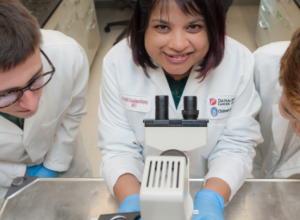As the namesake of our pediatric cancer research fund Dick Vitale says, “There are four words no parent wants to hear: ‘Your child has cancer.’” Those words are even more devastating when the diagnosis is diffuse intrinsic pontine gliomas (DIPGs), an extremely aggressive type of brain tumor in kids. Even though research has brought better results for many pediatric cancers, DIPGs have remained difficult to handle. In fact, the five-year survival rate for DIPGs is just 2%.
 Pratiti Bandopadhayay was training to become a pediatrician when she encountered kids facing brain tumors. When she saw the limited treatment options available, she decided to take things into her own hands: she went back to school, completed her Ph.D. and began a career as a neuro-oncologist and scientist.
Pratiti Bandopadhayay was training to become a pediatrician when she encountered kids facing brain tumors. When she saw the limited treatment options available, she decided to take things into her own hands: she went back to school, completed her Ph.D. and began a career as a neuro-oncologist and scientist.
She is now focused on developing new treatments for DIPGs at Boston Children’s Hospital and received a V Scholar Grant from the V Foundation in 2019, funded by the Dick Vitale Pediatric Cancer Fund.
Bandopadhayay and her team are focused on a gene called PPM1D, which is often mutated in children with DIPGs. They hope by studying this gene, they can target it, reverse the mutation and then develop new medications that can take out DIPGs.
“Our goal is to have effective treatments for every child, tailored to their exact tumor and the mutations found in it,” said Bandopadhayay. “By looking for errors in the DNA, we can see how cells differ within a tumor and that allows us to understand how these mutations may help the cancer develop.”
This type of research is critical. Pediatric brain tumors are the leading cause of cancer-related death in childhood, and many children who survive brain cancer are left with devastating side effects. Despite the clear need for better treatments, it can be tough for researchers like Bandopadhayay to get funding for their research without organizations like the V Foundation.
“Because the total number of children diagnosed with brain tumors is a lot lower than adult cancers, less resources and funding are available for pediatric cancers,” said Bandopadhayay. “Supporters of organizations like the V Foundation are changing this: the research you fund allows us to take ideas and see if they work in the lab, helping us move research forward more quickly. In fact, we have been able to use results from our V Scholar grant to obtain more funding to keep the research growing, including a Merit Award from the National Cancer Institute.”
Your donations make a difference. Scientists like Bandopadhayay and her team need your help to continue moving us closer to solving the mystery of aggressive cancers like DIPGs.
Every dollar you give helps researchers find more breakthroughs. It helps them develop better treatments. And eventually, it will make those four words no parent wants to hear much easier to stomach.




